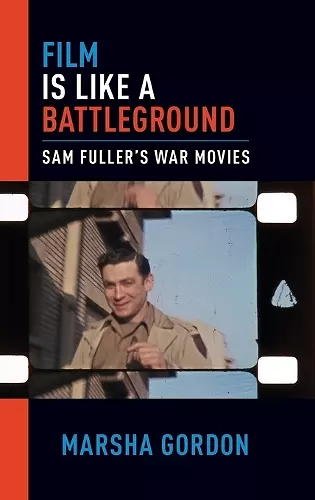Film is Like a Battleground
Sam Fuller's War Movies
Format:Hardback
Publisher:Oxford University Press Inc
Published:18th May '17
Currently unavailable, and unfortunately no date known when it will be back
This hardback is available in another edition too:
- Paperback£33.99(9780190269753)

Film is Like a Battleground: Sam Fuller's War Movies is the first book to focus on the genre that best defined the American director's career: the war film. It draws on previously unexplored archival materials, such as Fuller's Federal Bureau of Investigation files and WWII-era amateur films, to explore the director's lifelong interest in making challenging, thought-provoking, and often politically dangerous movies about war. After establishing the roots of Fuller's cinematographic schooling in the trenches during World War II, including careful consideration of his 16mm footage of a Nazi camp at the end of that war, Film is Like a Battleground explores Fuller's first forays into hot war representation in Hollywood with the pioneering Korean conflict films The Steel Helmet (1951) and Fixed Bayonets (1951). This pair of films introduced Fuller to his first run-ins with the American political machine when they triggered both FBI and Department of Defense investigations into his political sympathies and affiliations. Fuller's cold war films Pickup on South Street (1953) and, though it veers into hot war territory, Hell and High Water (1954) are Fuller's responses to the political pressures he had now personally experienced and resented. A chapter on Fuller's representation of pre-American-invasion Vietnam in China Gate (1957) alongside his unrealized Vietnam war screenplay, The Rifle (ca. late 1960s), illustrates the degree to which Fuller's representation of war and nation shifted even as he continued to probe war's impossible contradictions. Film is Like a Battleground would be incomplete without a thorough exploration of the films depicting the war Fuller personally experienced and spent a lifetime contemplating, WWII. Verboten! (1959), Merrill's Marauder's (1962), and The Big Red One (1980) demonstrate Fuller's representation of a morally justifiable war. Fuller's 1959 CBS television pilot--Dogface--offers a glimpse at one of Fuller's failed attempts to bring his WWII story into American living rooms. The book concludes with a chapter about a documentary film made late in the director's life that returns Fuller to the actual site of the Nazi's Falkenau camp, at which he discusses his experiences there and that powerful, unforgettable footage he shot in the spring of 1945.
Film Is Like a Battleground, besides being a highly readable and cogently written analysis of the director's war films, is archetypal as a potential textbook. Gordon shows us how to base our writing on factual, authentic sources and how to weave these empirical findings into a work of historiography and humanities scholarship. * Donald Crafton, The Moving Image *
Marsha Gordon's book is an engaging, lucidly written work of original and highly useful scholarship. * Rick Worland, Journal of Film and Video *
Film Is Like a Battleground reminds readers of how Sam Fuller carried his own personal history and the history of his adopted country into the stories he created, unafraid to testify, unafraid to arouse emotion, unafraid to reveal complexities, contradictions, and even despair. In confronting the difficult legacy of his adopted country, in raising questions about what it means to be an American, Fullers work provides a much-needed reminder of what true patriotism looks and sounds like * Lisa Dombrowski, Film Quarterly *
Marsha Gordons book on Fuller is part biography, part critical analysis, and its eminently worth reading on both counts. Primarily shes engaged in making connections between Fullers years with The Big Red One (aka the 1st Infantry Division) during World War II -- the seminal experience of his life -- and his filmmaking career ... Gordon emerges with some stunning informationGordons book leaves no doubt that the war was the making of Fuller as an artist and he knew it while it was still happening. * Scott Eyman, Film Comment *
It not only focuses on Fullers war movies but brings hitherto unknown archive material to light resulting in that rare combination of stimulating critical insights and very relevant excavation ... Using archival sources in an admirable and penetrating manner, Gordon succeeds in this projectGordons detailed researches into the Fuller archives often result in new discoveries ... reviewing Fullers legacy from another perspective to reveal its inherent humanity and relevance to an era in which we are again subject to the absurdity that Fuller earlier recognized. * Tony Williams, Film International *
In the engaging Film Is Like a Battleground: Sam Fullers War Movies, Marsha Gordon explores how Fuller grappled with trauma, memory, and the impossibility of realistically representing war across his eight combat and Cold War films as well as his television and script work ... Fuller was a master storyteller, and Gordons meticulous research reorients and adds texture to many of the yarns he told not only about his films, but also about his own lifeGordons focus allows her to provide sustained attention to individual pictures, interweaving discussion of their production and reception with detailed analysis of the films themselves and their political, cultural, and generic contexts. * Lisa Dombrowski, Film Quarterly *
ISBN: 9780190269746
Dimensions: 160mm x 236mm x 25mm
Weight: 698g
330 pages